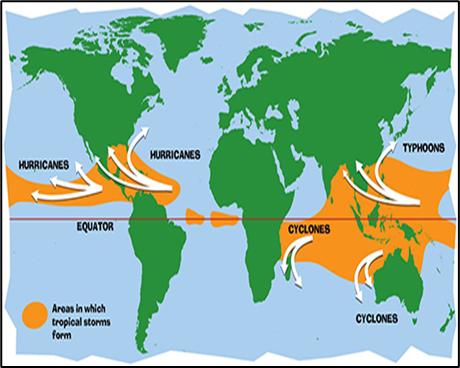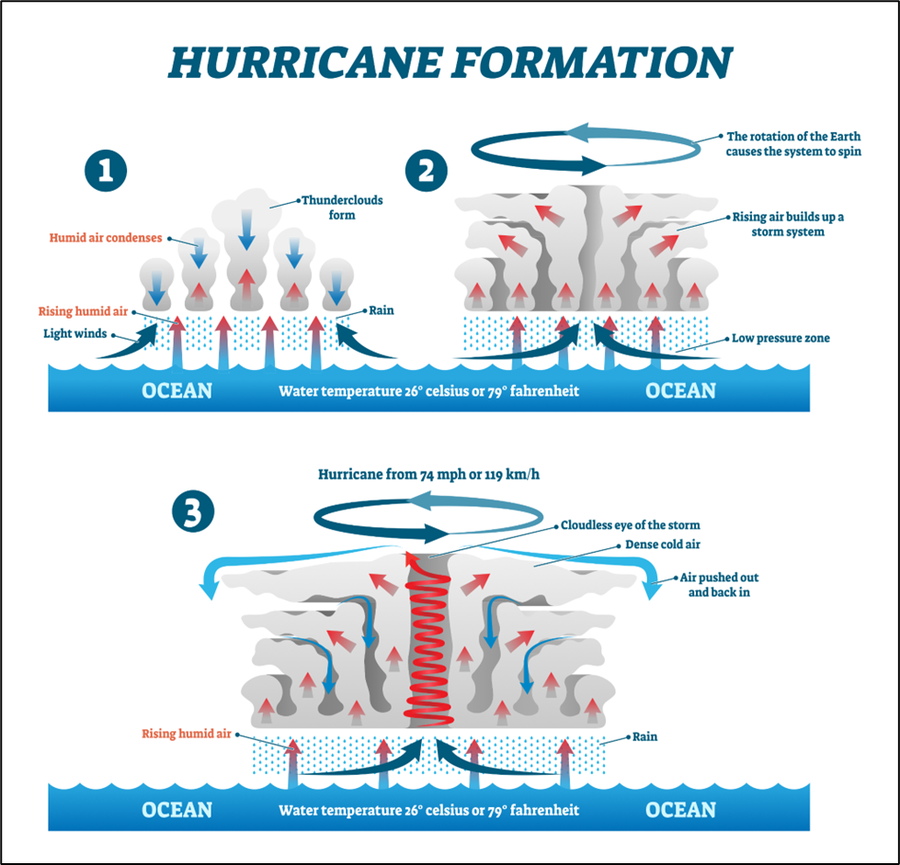Mains Daily Question
Aug. 21, 2023
Explain the phenomenon of the formation of hurricanes and briefly discuss how climate change is fueling the occurrence of hurricanes.
Approach:
Introduction: In light of the recent occurrence of Hurricane Hilary, briefly define hurricanes.
Body: Elaborate upon the phenomenon of the formation of hurricanes followed by writing points on the impacts of climate change upon hurricanes.
Conclusion: Briefly conclude by highlighting the importance of climate change mitigation to prevent this disaster.
Answer:
Recently, tropical storm (Hurricane) Hilary has adversely hit West Mexico and Californian coasts leading to intense rainfall and flash flood events. According to the World Meteorological Organization (WMO), a hurricane is a tropical cyclone with sustained winds of 119 kilometres per hour (74 miles per hour) or greater. The term "hurricane" is used in the Atlantic Ocean and northeastern Pacific Ocean.
Formation of Hurricanes:
1. A pre-existing weather disturbance: A hurricane often starts as a tropical wave, which is a low-pressure area that moves through the tropics. The tropical wave can be caused by a number of factors, including thunderstorms, wind shear, and upper-level troughs.
- Convergence of winds: The tropical wave needs to have winds converging towards it. This means that the winds need to be blowing from different directions and coming together at the centre of the wave.
- Updraft: The warm, moist air from the ocean rises into the atmosphere. As the air rises, it cools and condenses, forming clouds. The release of latent heat from the condensation helps to power the storm.
- Rotation: The rising air creates a low-pressure area at the centre of the storm. This low-pressure area causes the winds to spiral inward, which creates the rotation of the storm.
- Strengthening: The hurricane will continue to strengthen as long as it has warm, moist air to feed it. The winds will also continue to increase as the storm grows larger.
Climate changes fueling hurricanes:
- Early formation of storms: Hurricane activity is common in North America from June through November, peaking in September after a summer buildup of warm water conditions. However, the landfall in the US occurs more than three weeks earlier than it did in 1900, nudging the start of the season into May.
- More intense rainfall: Hurricanes are projected to become more intense, meaning that they will produce more rainfall. This is because warmer air can hold more moisture, and the water vapour in the air is what fuels hurricanes. During the 2020 Atlantic hurricane season, climate change boosted hourly rainfall rates in hurricane-force storms by 8-11 per cent.
- Slower-moving storms: Hurricanes are also projected to move more slowly. This is because the jet stream, which is a band of strong winds in the upper atmosphere, is expected to weaken in a warming climate. Slower-moving storms can stay over an area for longer, which can increase the amount of damage they cause.
- Frequent rapid intensification: Rapid intensification is when a hurricane's wind speed increases by at least 35 knots (40 miles per hour) in 24 hours. NOAA also projects that the proportion of hurricanes reaching the most intense levels with Category 4 or 5 could rise by about 10 per cent this century.
- More extreme events: Climate change is also making extreme weather events, such as major hurricanes, more likely. This is because the atmosphere is becoming warmer and more unstable, which can lead to more severe storms. According to NOAA, in the US, Florida has witnessed the most hurricanes making landfall, with more than 120 direct hits since 1851.
According to IPCC, the world is on track to warm by 2.7 degrees Celsius by the end of the century, if no action is taken to reduce greenhouse gas emissions. This additional heat can fuel hurricanes intensity more than ever hence transition to renewable energy, reducing emission intensity and international cooperation to achieve Paris goals is the need of the hour.



